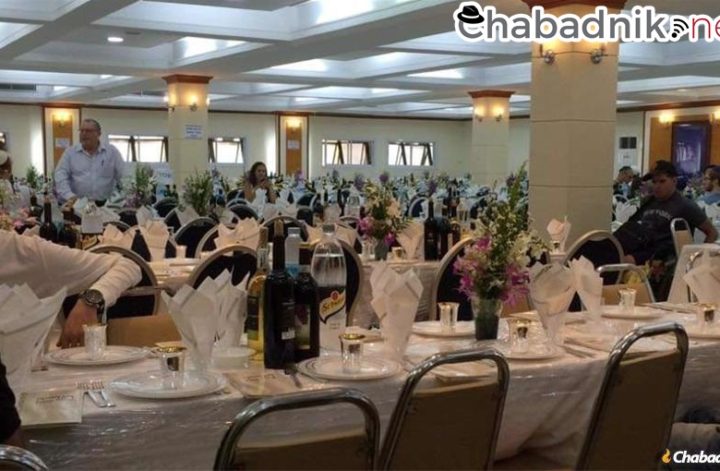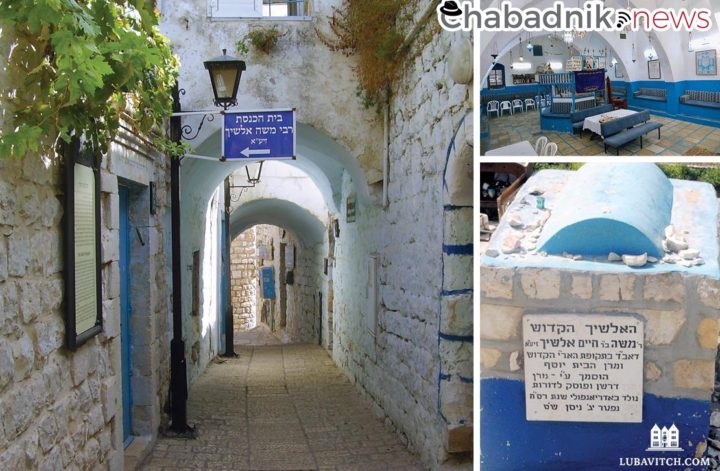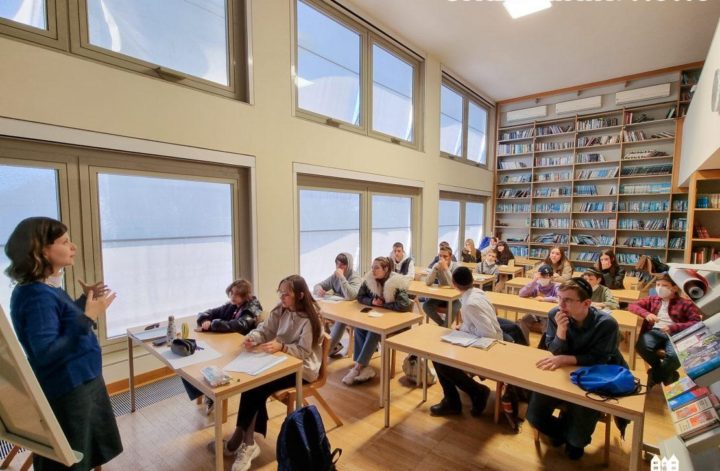Millions to once again join in family gatherings and communal Seders
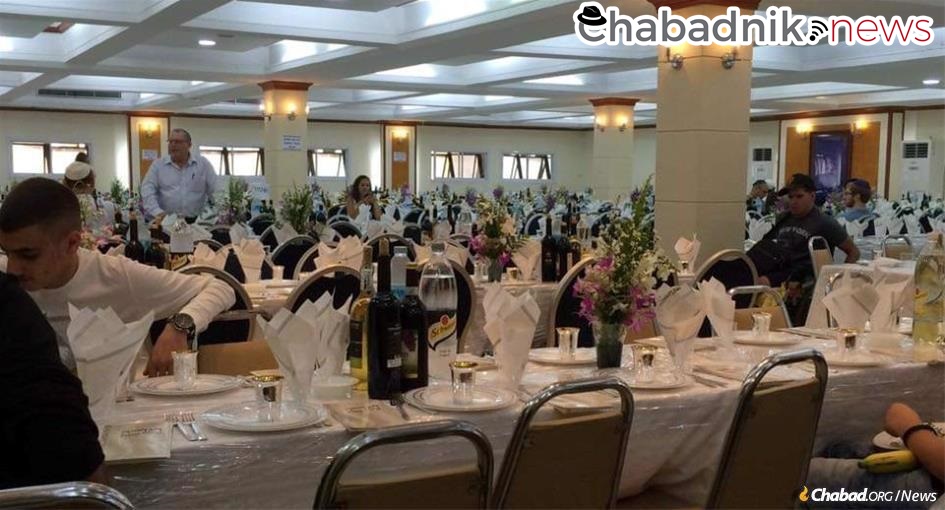
Passover is right around the corner, and Jewish families and friends around the world are eagerly looking forward to being together once again on the Seder nights. Chabad-Lubavitch centers are opening their doors to a record number of guests, and everyone is looking forward to renewed connection and community after the past two years. The holiday, which begins before sunset on Friday, April 15, and lasts through nightfall on Saturday, April 23, celebrates the Jewish people’s exodus from slavery in Egypt, an especially meaningful message of hope and promise this year for the Jews of Ukraine.
Burt Gershater and his wife, Wendy Weed, are eagerly anticipating spending Passover with Chabad of Flagstaff in Arizona. They’ll travel from their home in Bend, Ore., to Flagstaff, where they will be reunited with Chabad co-directors Rabbi Dovie and Chaya Shapiro, as well as the community Gershater joined when “Rabbi Dovie” knocked on his office door some 16 years ago. Once they realized they would be in Flagstaff over the holiday, attending the Seders at Chabad was the clear choice, says Gershater. “It wasn’t even like I had to think about it for half a second—it was just that pure joy to be back with my community.”
Like many, the Gershaters haven’t traveled much over the past two years, and that meant celebrating the Passover Seders at home, just the two of them. Now, the couple looks forward to a happy reunion for the holiday, full of energy, community and love. “When I go back there, there will be more joy and laughter and tears,” he says. “I haven’t been there, and we miss each other so much.”
Rabbi Shapiro sees it similarly. He and his wife are preparing for visitors from all over the world who will be making the trip to spend Passover with them in Arizona, as well as to enjoy the Grand Canyon and the nearby red rocks of Sedona.
“It’s very exciting this year. Things have opened up so much; people are traveling more and getting out,” he tells Chabad.org. Chabad is bringing a kosher catering team from New York to help make food for what they’re expecting will be “a larger crowd than ever before.”
Rabbi Nochum Yusewitz, co-director of Chabad of Grass Valley, Calif., with his wife, Chyena, is also expecting full attendance because people are so excited to come out. They’re planning to put up a tent on their property in Northern California’s Gold Country for a Seder of around 100 guests. “People are looking for real, authentic Judaism, but at the same time, just real, genuine joy, love and happiness,” he says. The Chabad center will also offer Passover essentials to the community for those who choose to host Seders at home.
For different kinds of Passover essentials, Chabad.org is once again providing a wealth of inspirational and informational articles in its “Celebrate Passover” section.
Readers are able to sell their chametz (leavened goods) online; find the nearest Seder; order shmurah matzah online; find some great Passover recipes; and order Chabad.org’s best-selling Haggadah or download it for free.
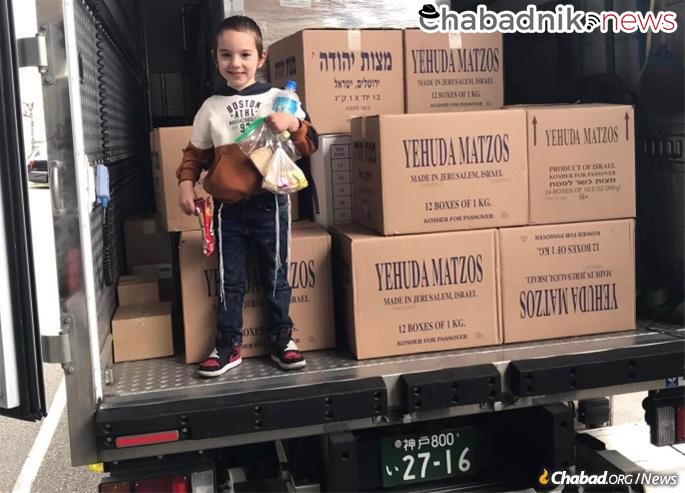
According to the Pew Research Center, Passover is the most observed Jewish holiday in the United States, with some 70 percent of its Jewish population of 5.7 million usually participating in a Seder. For the past seven decades, Chabad has been on the forefront of making Passover accessible to Jews, wherever they are and with whatever they need.
This global Passover campaign was launched in the early 1950s by the Rebbe—Rabbi Menachem M. Schneerson, of righteous memory—who stressed the importance of making sure that Jewish communities and individuals around the world had everything they needed for Passover. This included a special emphasis on making sure every Jewish man, woman and child had access to traditional shmurah matzah. This year by the time Passover dawns, Chabad will have distributed approximately 4 million handmade shmurah matzah for people to enjoy at a communal Seder or at home.
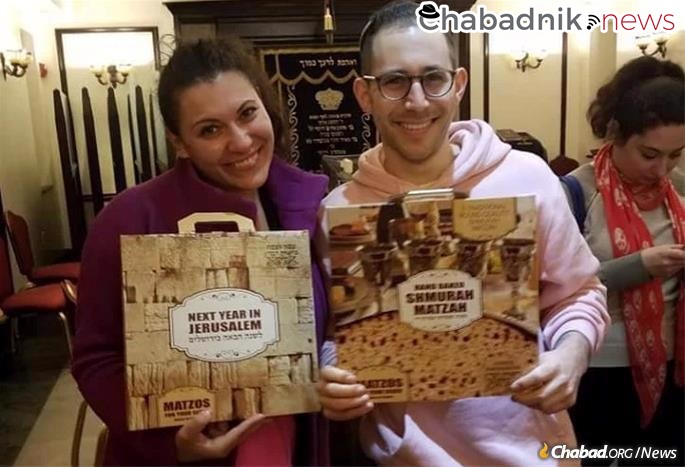
Passover for the Jews of Ukraine
Similarly inspired by the Rebbe’s call to action, providing the Passover essentials for the Jews of Ukraine wherever they may be is an urgent preoccupation for Chabad-Lubavitch around the world.
It’s a lonely and frightening time for those beset by war, many of them refugee women and children who fled the country while their husbands were unable to leave Ukraine with them. But Chabad emissaries from the embattled country—some of whom themselves evacuated with just a few bare necessities—have scrambled to cater to the needs of their constituents, including those in Ukraine, as well as those in Europe and those in Israel.
Joined by organizations like Chabad’s Federation of Jewish Communities of Ukraine, the Federation of Jewish Communities of the CIS and Colel Chabad, emissaries from Ukraine are working around the clock to meet the needs of the refugees and those still in Ukraine. Some Chabad emissaries are arranging communal Seders for whoever is able to join, and sending 50,000 Seder kits to those who are still in their homes in Ukraine.
In Israel, entire refugee communities are planning to be together in kosher-for-Passover facilities, where they will sing, celebrate, pray and encourage each other for the weeklong holiday.
But where do people find an empty hotel on just a few weeks’ notice? Some communities are using yeshivahs, virtually all of which are on Passover break and that have ample dorm rooms, dining halls, synagogues and commercial kitchens for communities to celebrate the Seder and at least the first days of the holiday together.
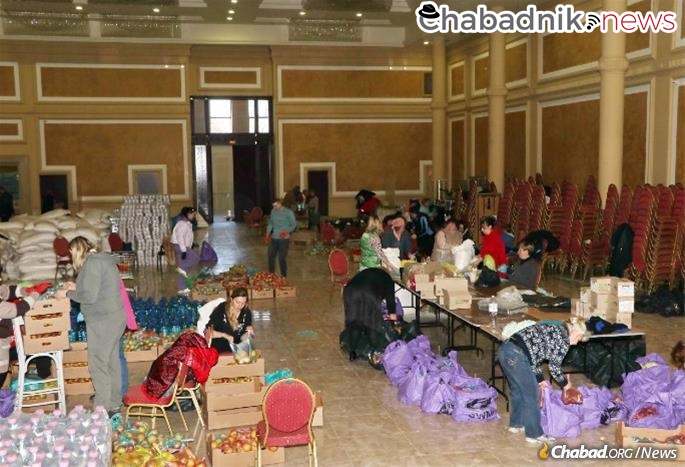
Home-Grown Seder for 300 in Japan
Communal seders that focus on the unique needs of individual Jewish communities are part and parcel of Chabad-led Seders around the globe. Not everywhere in the world is fully open to travelers just yet, but that hasn’t stopped Rabbi Mendy and Chana Sudakevich, co-directors of Chabad of Tokyo, Japan, from growing their local community and getting their Seder table ready for some 300 guests.
Chabad will host Seders in several locations around Japan, and since government regulations still don’t allow them to bring yeshivah students in to help, they’ll send supplies and help organize locally run Seders in other regions. “Every Passover, we hosted a Seder for the community, and a Seder for tourists, but the last two years, we had no tourists,” says Rabbi Sudakevich. “This year we placed a lot of focus on reaching out to people we didn’t know before, and our Jewish community in Japan has grown.”
Chabad of Japan ordered Passover staples early this year. And Sudakevich says they’re delighted to see their shipments of chicken and other Passover staples such as matzah and wine starting to come in.
“We are most excited to get together again, and everybody is going to see one another,” he says. “The Seders will be like the ones we held before 2020—just bigger.”
Seder Under the Stars in Cancun
Tourists have been coming to Mexico throughout the pandemic, and so it’s business as usual for Rabbi Mendel and Rachel Druk, co-directors of Chabad Jewish Center of Cancun. They are getting ready to host some 450 people for the Seders, including travelers finishing their spring breaks. They’ve spent the last weeks holding model matzah bakeries for local children and are giving out other Passover necessities.
Their Seder guests, as usual, will likely hail from more than a dozen countries, as they do every Shabbat. Wherever they’re from, they’ll be able to see how much they have in common as Jews and also be able to connect to the Passover story. “Many people feel when they leave their immediate stressful environments, they feel liberated, so it’s something people can relate to on a small scale,” he says of their travelers. “People coming to Cancun in general are leaving the stress behind. Passover is about doing that, too, just on a loftier level.”
In Memphis, Tenn., people are re-engaging and experiencing the freedom that comes with coming together, explains Rabbi Levi Klein, who co-directs Chabad of Tennessee with his wife, Rivky. They saw a packed house on Purim and expect that Passover will also be back to normal. Reservations have been rolling in for their public Seder the first night; they expect some 150 guests.
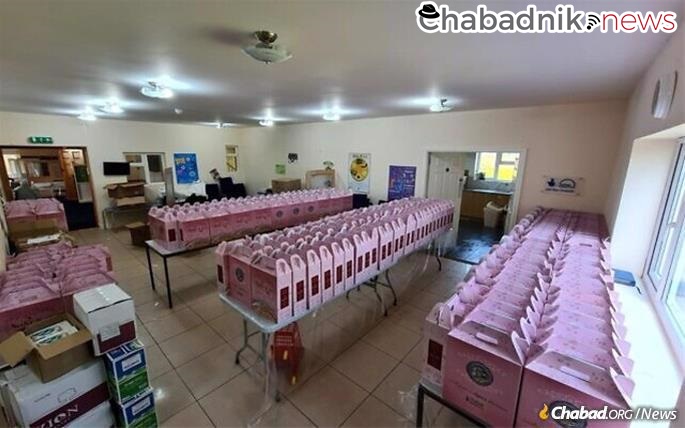
Everything is made in-house by Rivky Klein, he says, adding that his wife’s food is a big draw for the Seder. They turn a commercial kitchen kosher-for-Passover, and the food is made fresh, starting the week before, he explains.
While some people have been in and out of the Chabad regularly for services and programming, for many, the upcoming Seder will mark the end of their isolation.
“We’re looking forward to personal freedom,” says Rabbi Klein. “It’s so important to have the support of Jewish community—to be joining together Jewishly and growing.”

